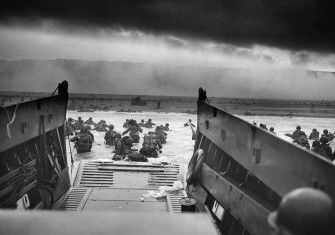The Liberation of Europe: A Bridgehead Too Late?
John Grigg questions whether D-Day could have taken place earlier and, instead, did it drag out the course of the war?
 On June 6th, 1944, British, American and Canadian forces landed in Normandy. By the end of the day they had broken through the German defences and secured a substantial, if still precarious, bridgehead. Only on one of the beaches, the American 'Omaha', was there really serious resistance, and even that was overcome by early afternoon.
On June 6th, 1944, British, American and Canadian forces landed in Normandy. By the end of the day they had broken through the German defences and secured a substantial, if still precarious, bridgehead. Only on one of the beaches, the American 'Omaha', was there really serious resistance, and even that was overcome by early afternoon.
The achievement of June 6th cost the Allies about 10,000 casualties, of whom about 2,500 were killed. On the face of it, therefore, D-Day was not only a great and glorious triumph, but relatively economical as well.






